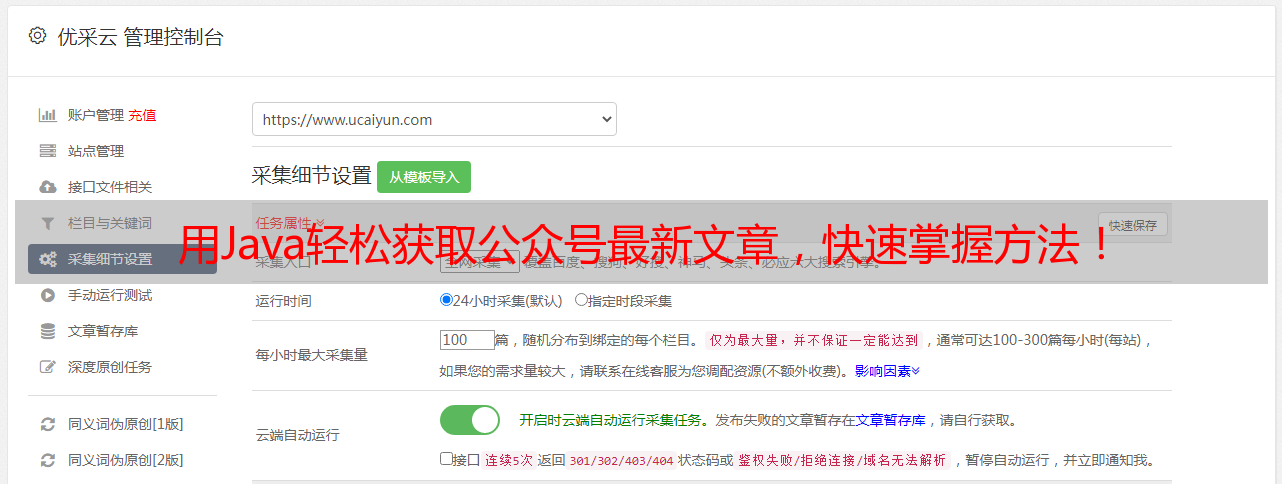用Java轻松获取公众号最新文章,快速掌握方法!
优采云 发布时间: 2023-04-29 09:42作为一名自媒体人,我们都知道公众号是一个非常重要的平台。不仅可以让我们与读者互动交流,也能够帮助我们推广文章。但是,如何获取公众号最新文章呢?今天,我将向大家介绍如何使用Java获取公众号最新文章。
一、登录微信公众平台
首先,我们需要登录微信公众平台,在左侧菜单中选择“素材管理”,然后点击“新增图文素材”按钮。在弹出的窗口中,填写好文章标题、作者、封面图片等信息,并编辑好正文内容。点击保存即可发布文章。
二、获取access_token
在使用Java获取公众号最新文章之前,我们需要先获取access_token。access_token是调用微信接口的访问凭证,每次调用接口都需要带上access_token参数。获取access_token的方法有多种,这里我们介绍一种简单的方式:使用HttpClient发送GET请求获取access_token。
java
public String getAccessToken(String appid, String secret){
String url ="https://api.weixin.qq.com/cgi-bin/token?grant_type=client_credential&appid="+ appid +"&secret="+ secret;
HttpGet httpGet = new HttpGet(url);
CloseableHttpClient httpClient = HttpClients.createDefault();
try {
CloseableHttpResponse response = httpClient.execute(httpGet);
String result = EntityUtils.toString(response.getEntity(),"UTF-8");
JSONObject jsonObject = JSONObject.parseObject(result);
return jsonObject.getString("access_token");
} catch (IOException e){
e.printStackTrace();
}
return null;
}
三、获取公众号文章列表
获取access_token之后,我们就可以使用Java调用微信接口获取公众号最新文章了。具体来说,我们需要使用HttpClient发送GET请求,获取文章列表。以下是示例代码:
java
public List<Article> getArticles(String accessToken){
String url ="https://api.weixin.qq.com/cgi-bin/material/batchget_material?access_token="+ accessToken;
HttpPost httpPost = new HttpPost(url);
httpPost.setHeader("Content-Type","application/json;charset=UTF-8");
JSONObject jsonObject = new JSONObject();
jsonObject.put("type","news");
jsonObject.put("offset",0);
jsonObject.put("count", 10);
StringEntity entity = new StringEntity(jsonObject.toJSONString(), Charset.forName("UTF-8"));
httpPost.setEntity(entity);
CloseableHttpClient httpClient = HttpClients.createDefault();
try {
CloseableHttpResponse response = httpClient.execute(httpPost);
String result = EntityUtils.toString(response.getEntity(),"UTF-8");
JSONObject jsonResult = JSONObject.parseObject(result);
JSONArray jsonArray = jsonResult.getJSONArray("item");
List<Article> articles = new ArrayList<>();
for (int i =0; i < jsonArray.size();i++){
JSONObject itemJson = jsonArray.getJSONObject(i);
Article article = new Article();
article.setTitle(itemJson.getString("title"));
article.setAuthor(itemJson.getString("author"));
article.setContent(itemJson.getString("content"));
article.setUrl(itemJson.getString("url"));
articles.add(article);
}
return articles;
} catch (IOException e){
e.printStackTrace();
}
return null;
}
四、解析文章内容
获取到文章列表之后,我们需要对每篇文章的内容进行解析。具体来说,我们需要使用Jsoup解析HTML代码,并提取出正文内容。以下是示例代码:
java
public String parseContent(String html){
Document doc = Jsoup.parse(html);
Elements elements = doc.select("div.rich_media_content");
if (elements.size()>0){
Element element = elements.get(0);
element.select("p.wechaty-video").remove();
element.select("p.wechaty-audio").remove();
element.select("mpvoice").remove();
element.select("iframe").remove();
element.select("script").remove();
return element.html();
} else {
return "";
}
}
五、将文章保存到数据库
最后,我们需要将获取到的文章保存到数据库中。这里我们使用MySQL作为数据库,使用JDBC连接MySQL数据库,并将文章信息保存到数据库中。以下是示例代码:
java
public void saveArticles(List<Article> articles){
Connection conn = null;
PreparedStatement stmt = null;
try {
Class.forName("com.mysql.jdbc.Driver");
String url ="jdbc:mysql://localhost:3306/test?useUnicode=true&characterEncoding=utf-8";
conn = DriverManager.getConnection(url,"root","123456");
String sql ="INSERT INTO article(title, author, content, url) VALUES (?,?,?,?)";
stmt = conn.prepareStatement(sql);
for (Article article : articles){
stmt.setString(1, article.getTitle());
stmt.setString(2, article.9e1fef4b4c6add651c91e43d885d05ce());
stmt.setString(3, article.getContent());
stmt.setString(4, article.getUrl());
stmt.executeUpdate();
}
} catch (ClassNotFoundException e){
e.printStackTrace();
} catch (SQLException e){
e.printStackTrace();
} finally {
try {fc63d90fadddfc745f2575f8a4248318(stmt != null){
stmt.close();
}fc63d90fadddfc745f2575f8a4248318(conn != null){
conn.close();
}
} catch (SQLException e){
e.printStackTrace();
}
}
}
至此,我们就完成了使用Java获取公众号最新文章的过程。希望能够对大家有所帮助。
以上内容由优采云提供,优采云是一家专业的SEO优化公司,致力于为企业提供高质量的SEO优化服务。如果您需要SEO优化服务,请联系我们:www.ucaiyun.com。



